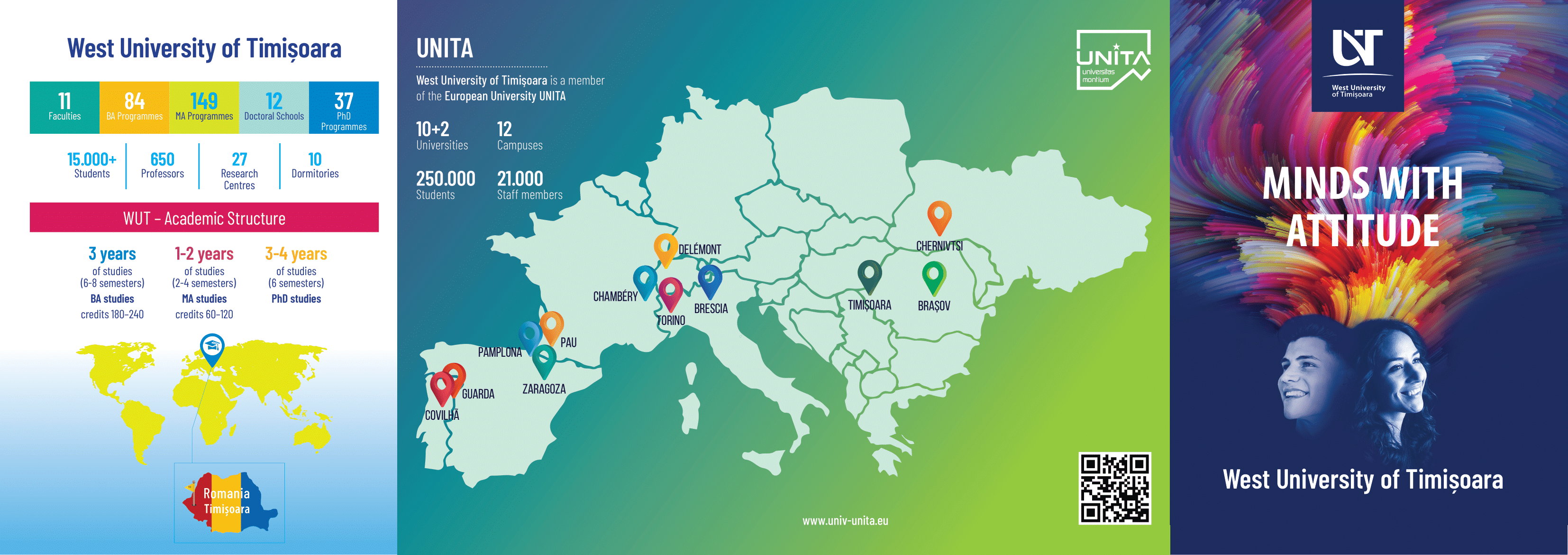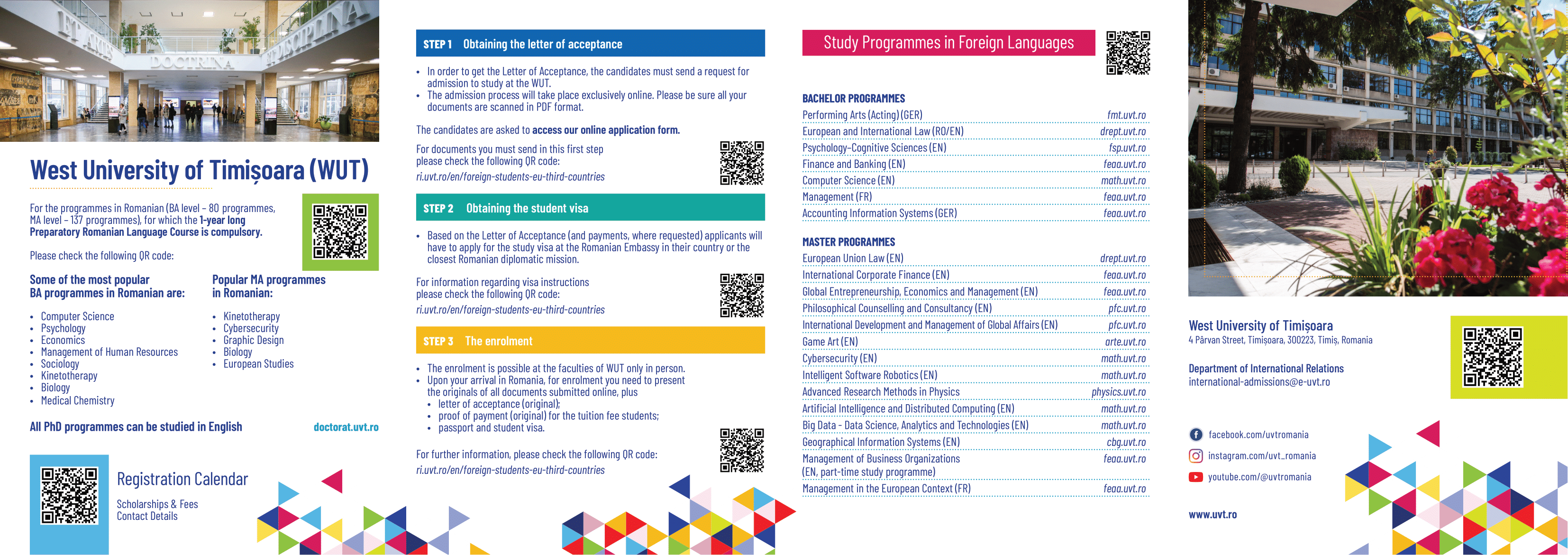We are glad to announce the 6th edition of the
”West University of Timisoara Summer School”
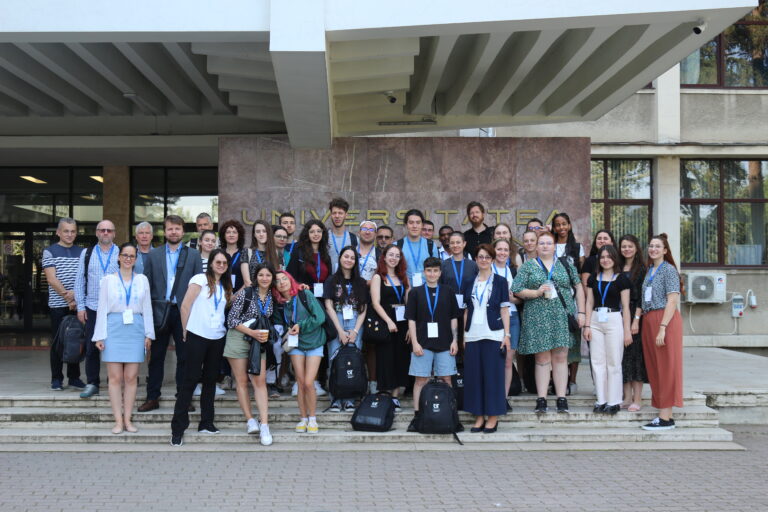
This year, the 6th Edition of the “West University of Timisoara Summer School” will take place in Timisoara. The period in which our event will be taking place is June 10th – July 5th, 2024, however, the period might differ according to the short-term study programme selected.
Our Summer School seeks to be an inter and multi-disciplinary one. On top of everything, all students are welcome – national or international, Bachelor or Master level. Each participant can focus on his/her area of interest and add value to their personal and professional development by participating in this event.
If you’re looking for the best way to spend the beginning of your summer while engaging in interesting and challenging short-term study programmes, you’ve come to the right place!
Application deadline: 20th March, 2024
What do we offer during the Summer School?
→ A certificate of completion of the course followed within the event, valuing 1, 2 or 3 ECTS credits;
→ Course materials;
→ Accommodation;
→ Lunches;
→ Promo kits
The courses we are offering this year are:
There will be introductory presentations of digital painting, concept art, digital modeling, texturing, rigging, photogrammetry, animation, rendering, etc. At the same time, at the end, small practical projects will be carried out to implement the theoretical aspects presented in the first part of the course.
Date: 17th-21st June 2024
Nr. ECTS: 1 ECTS
Teachers’ description
The 3 teaching staff have extensive experience in the field of the proposed course, both from a didactic and professional point of view. Sergiu Zegrean is the organizer of the Fictionart International Exhibition that took place within the Faculty of Arts and Design (2022). Alex Bunii is co-curator at the International Ocean Art Festival in South Korea. Lucian Ciorba is an expert in the field of multimedia.
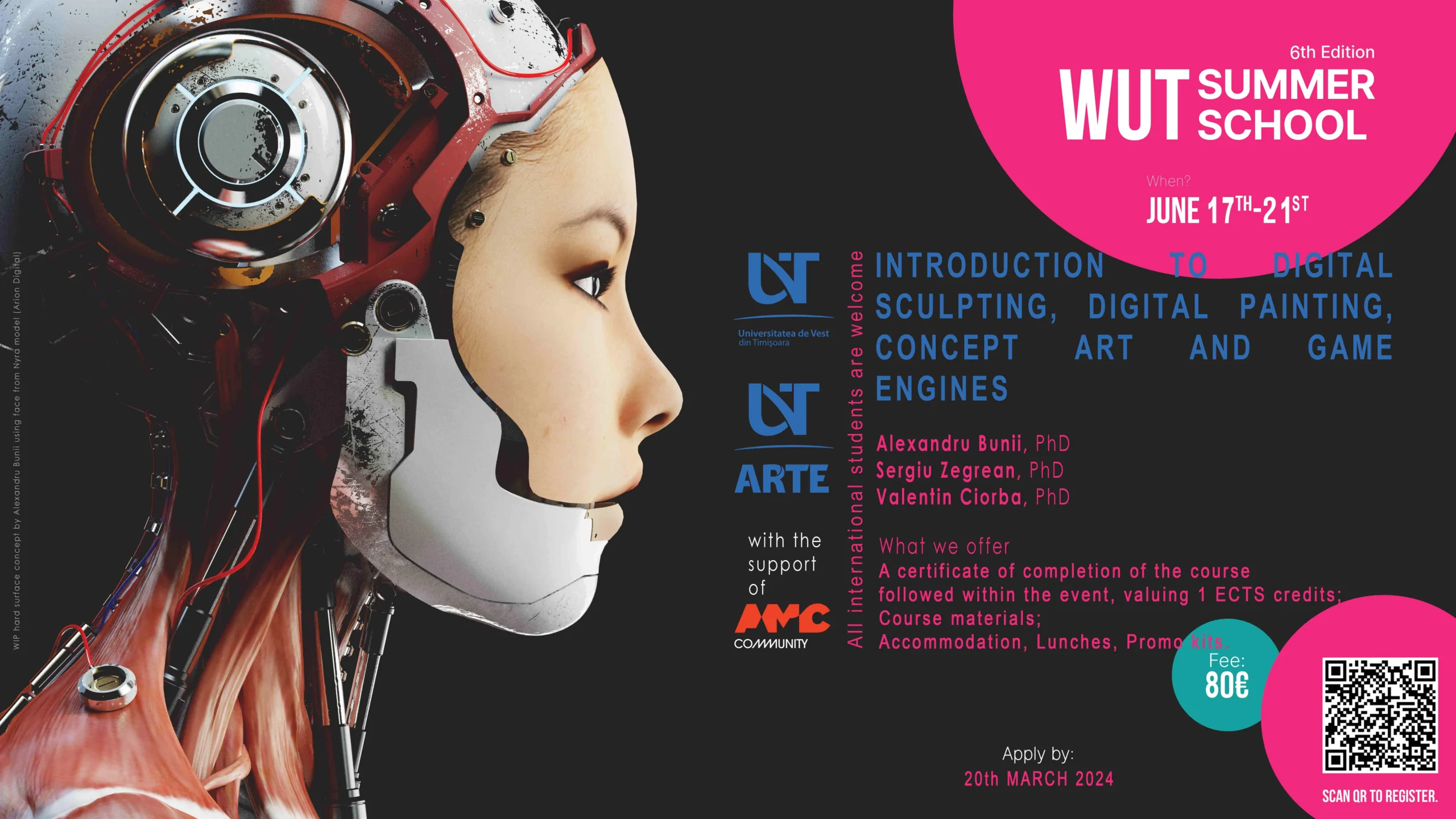
Have you ever wondered how you can study the language your friends use online, or the latest show you have binged? Then this Summer School is for you! DILARASS will offer you an introduction to the concepts, tools, and techniques of Digital Humanities, Corpus Linguistics, and insights into the application of technology to support language learning and teaching.
The course Digital Technologies for Language Research and Applications offers students a basic introduction to the concepts, tools, and techniques of Digital Humanities (DH) and Corpus Linguistics (CL). Students will become acquainted with the current landscape of the field of digital technologies for the field of humanities. Introductory lectures will be followed by hands-on workshops which will employ the resources available at the CODHUS centre (platforms such as https://roger-corpus.org/, https://expres-corpus.org/, https://comparaq.eu/), with whom students will become familiar. The course will showcase the interdisciplinary synergies between conventional and technology supported approaches to language.
Date: 17th-21st June 2024
Nr. ECTS: 1 ECTS
More information on DILARASS webpage.
Teachers’ description
Madalina Chitez is a Senior Researcher in applied corpus linguistics at the West University of Timisoara. She received her PhD in corpus linguistics from Albert-Ludwig-University Freiburg, Germany, and worked as a researcher at the University of Zurich and the University of Applied Sciences Zurich, Switzerland, for eight years. She has also participated in research exchange programmes at the University of Oxford and Coventry University (UK) and the University of Siena (Italy). Dr Chitez has coordinated extensive research projects focusing on the creation of corpora of academic writing, such as ROGER (Comparable Bilingual Romanian-English Corpus of Academic Genres in Romania – academic texts collected from students) and DACRE (Comparable Bilingual Romanian-English Corpus of Disciplinary Genres in Romania – academic texts collected from experts). She is the initiator, co-founder and president of the Centre for Corpus Related Digital Approaches to Humanities (CODHUS), which has a strong application-oriented character. CODHUS activities aim at creating multidisciplinary synergies between departments, resulting in practical solutions for research, teaching, learning or large-scale use: language-related digital research methods, software solutions for universities or pre-university settings (language teaching, translation tools, digital humanities teaching methods) and various online resources (websites, digital guides, databases). She has published in numerous international journals and collective volumes and co-edited four volumes. Her areas of interest and expertise are: applied corpus linguistics, digital humanities, academic writing, contrastive linguistics, computer-assisted language learning, language learning, language teaching, innovative teaching, research management, policy development in higher education.
Alexandru Oravițan is Research Assistant PhD at the West University of Timișoara, Romania. He has conducted extensive research into post-9/11 literature as part of his doctoral work. Currently, his postdoctoral research endeavours revolve around contemporary American literature and culture, as part of his affiliation with the American Studies Center (CSAM), and corpus linguistics, with particular focus on readability research, within the Centre for Corpus Related Digital Approaches to Humanities (CODHUS).
Loredana Bercuci is an assistant professor at the Department of Modern Languages of the West University of Timișoara, where she teaches English for Specific Purposes, Applied Linguistics and American cultural history. She holds a Ph.D. in American Cultural Studies and her research interests include English for Specific Purposes teaching, academic writing, corpus linguistics, and critical theory.
Roxana Rogobete is Teaching Assistant at the Department of Romanian Studies of the West University of Timișoara, Romania. She teaches Literary Theory, Ethics, Romanian literature and New approaches in literary studies. Her Ph.D. in comparative literature focused on German-language migrant literature written in the postwar period. She has been involved as a postdoctoral researcher in projects such as ROGER (https://roger.projects.uvt.ro/), DACRE (https://dacre.projects.uvt.ro/), LEMI (https://lemi.projects.uvt.ro/). Her research interests include Romanian literature, digital humanities, academic writing, and ethics in the humanities. She is the secretary of the Centre for Corpus Related Digital Approaches to Humanities (CODHUS) and responsible for tutoring volunteers and interns at the centre.
Karla Csürös holds an M.A. degree in American Studies from the West University of Timișoara and is currently pursuing a Ph.D. with a topic at the intersection of applied corpus linguistics, telecinematic stylistics, cultural studies (A Corpus-Based Inquiry into the Language of Contemporary American Workplace Sitcoms). Her main research interests include pop culture, American literature and creative writing, predominantly investigating works from such fields through a corpus linguistics lens.
Andreea Dincă is a doctoral researcher at the West University of Timișoara, Romania, where she is currently pursuing a Ph.D. in applied corpus linguistics. Her research concerns phraseology in Romanian Learner English writing in an academic setting. Her main research interests are applied corpus linguistics, Learner Corpus Research, phraseology, academic writing, and, since her Fulbright doctoral scholarship, language teaching and web-based platforms as academic writing support for thesis writing in English by L1 Romanian students.
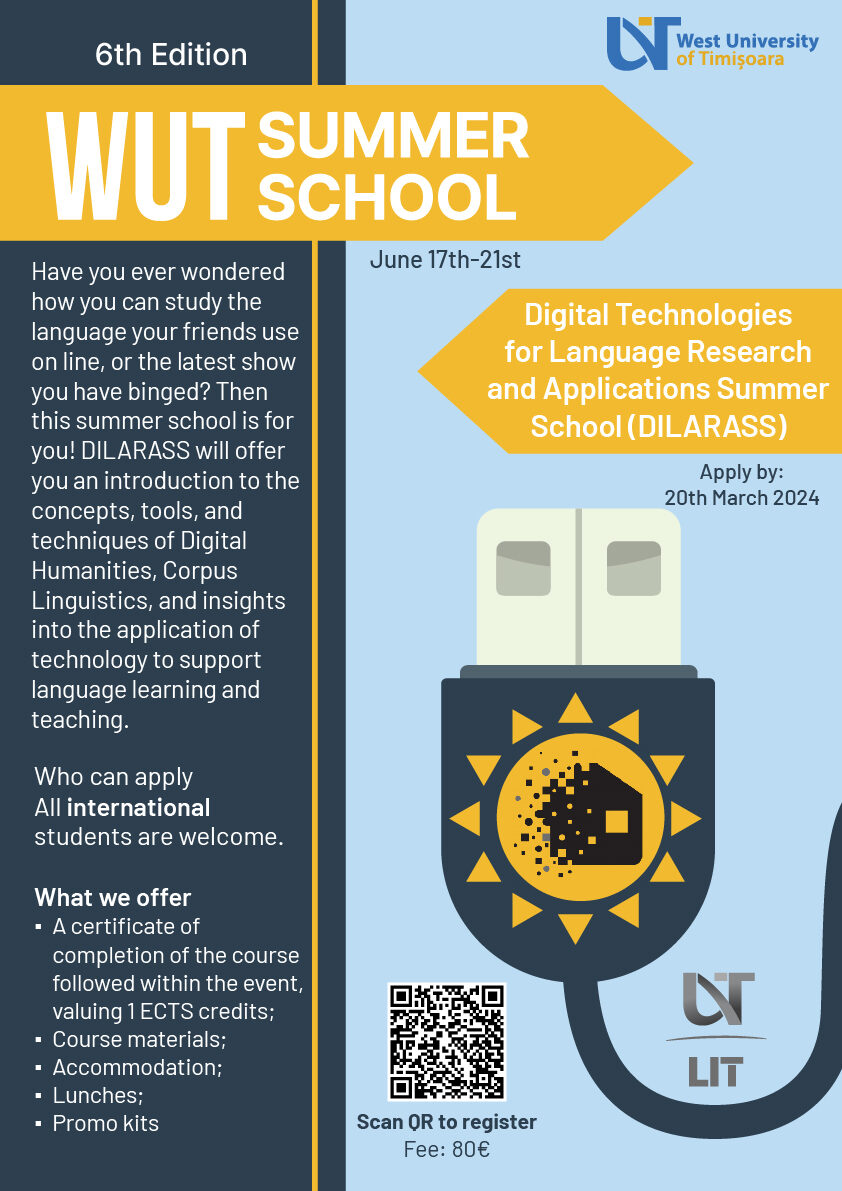
The History of Physical Education and Sport course is intended to provide additional information on general knowledge and not only on human exercise. This course will take the student on a journey through time from prehistoric times to the present day. In order to understand how today’s branches of sport came into being, it is necessary to understand man’s need for movement. This journey aims to show that the main means of action in sport originated in ancient cultures. The evolution of the phenomenon of sport would not be possible without the lessons learned from them. The Olympic Games are one of the biggest global sporting events, however it is important to know the origins of this event in order to understand the symbolism of the events.
Technical and methodical swimming – Through this course we want to promote among students the practical benefits of physical exercise in the aquatic environment, the techniques by which they can swim both for recreational and sports purposes and presentation of a short history of the discipline in Romania and in the world.
Date: 17th-21st June 2024
No. ECTS: 2 ECTS
Teachers’ description
Arnăutu Gabriel is a PhD lecturer at the Faculty of Physical Education and Sport at the West University of Timisoara. He graduated the Bachelor’s and Master’s degree courses at the same faculty, and from 2022 I have a PhD in Sport Science and Physical Education. He started teaching in 2016 as a young teaching assistant with physical education as his main subject. Later he started being interested in the outdoor physical activities module and then to history. The main areas of interest are boxing, sports training and history of physical education, currently teaching these subjects at university.
Pîrjol Dan Ionuț is a Junior Assistant at the Faculty of Physical Education and Sport at the West University of Timisoara. He is a graduate of the Bachelor’s and Master’s degree courses at the same faculty, and from 2023 he has submitted his PhD thesis in Sport Science and Physical Education. He has a great interest in swimming where he has a long experience also as an athlete being a multiple champion at national and international level and also as a teacher.
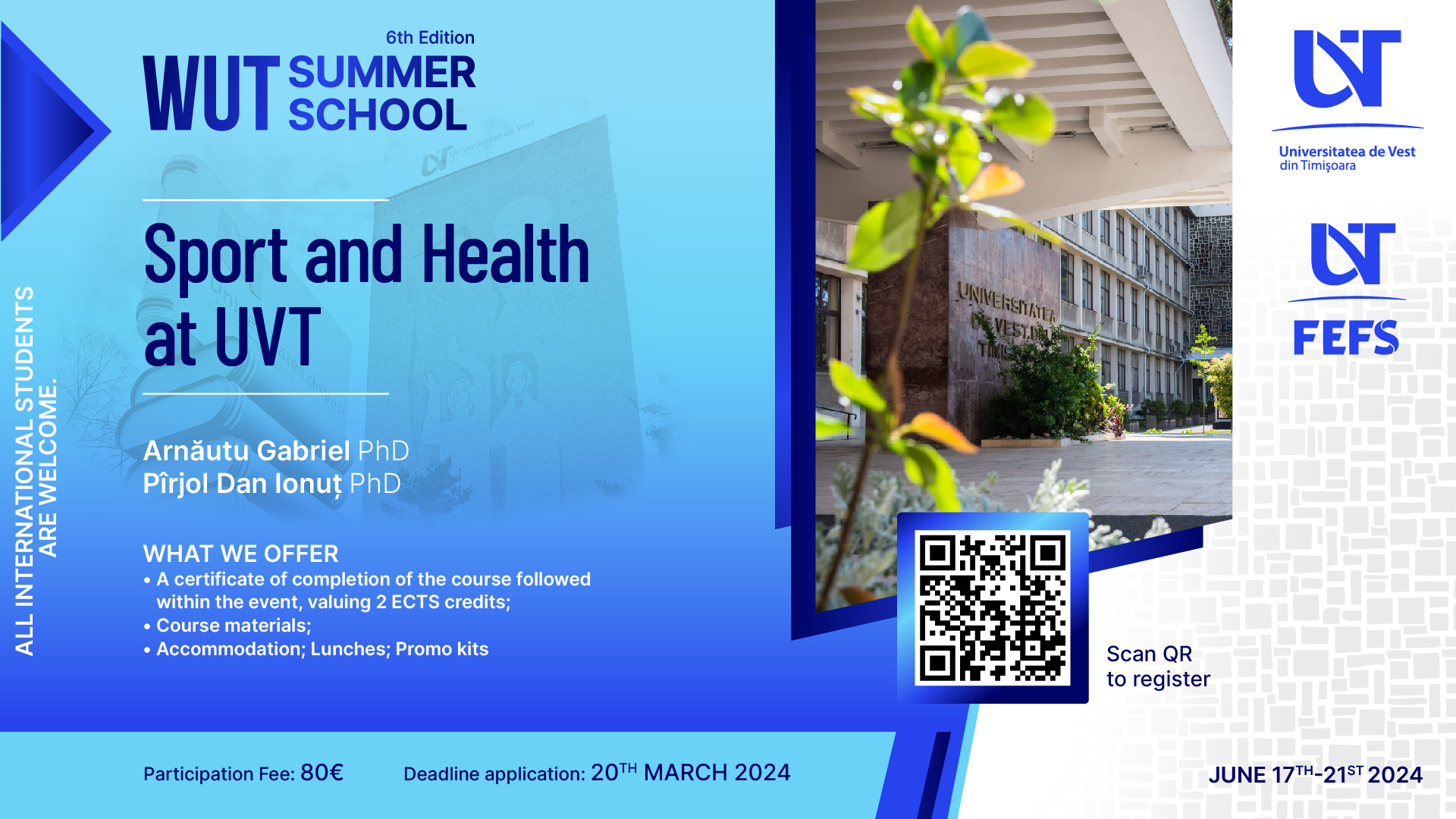
The course covers sustainable and green investments, as well as green banking in line with SDG requirements. Additionally, the behavioural aspects underlying investments are emphasized.
Date: 10th-14th June 2024
Nr. ECTS: 1 ECTS
Teacher’s description
Liliana Donath is currently a full professor of Finance, teaching Public finance, Monetary economics, Behavioural finance and Green and Responsible investments. She is also a PhD supervisor, and her research regards the above-mentioned topics.
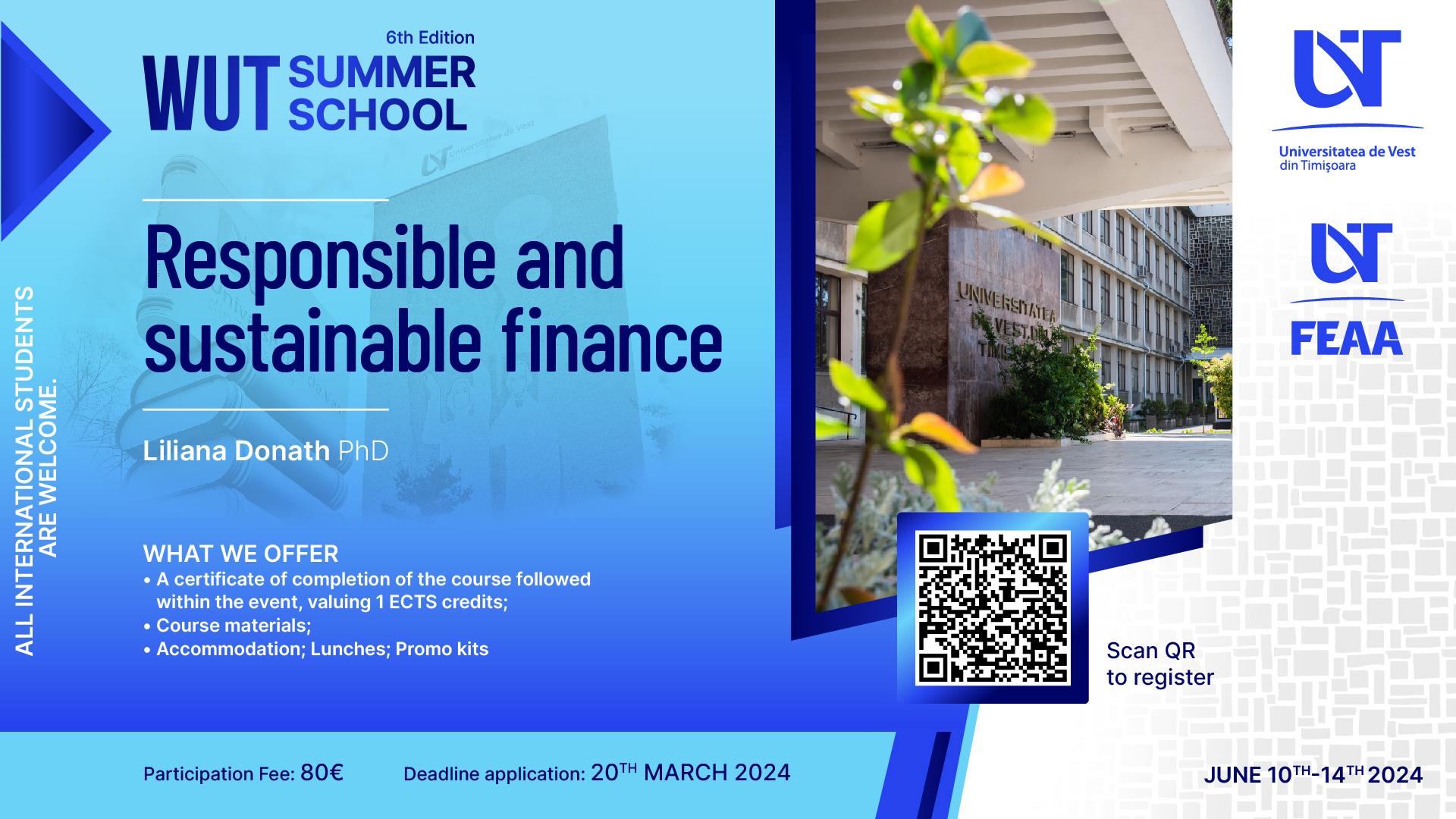
Day 1 (5 hours) – Opening event: presentation of the summer school course and program, students meet each other; Conceptual and theoretical frame; Methodological frame (fieldwork activities structure, research instruments, report structure, final presentation structure), organizing team-based collaborative study groups, each group being formed by students from different universities.
Days 2, 3, 4 (15 hours) – Field visits to different living areas of Timisoara and cultural points of interest related to the ECC2023, where students document and collect information through visual research instruments and participatory observation for their team-based projects (observation grid, transect walks, social resources map, cultural resources map, documentary photos).
Some of the fieldwork areas will be revisited for in-depth observations and better understanding of the studied urban area (e.g. The same site at different hours/days could reveal a different urban context, a more crowded one, populated with different social-occupational categories of users).
Students will receive everyday feedback from the teachers and from peers about their ongoing fieldwork activities. The formative evaluation aim is to support students’ involvement in the learning activities and by giving feedback and correction suggestions, to ensure the best learning results at the end of the program.
Day 5 (5 hours) – completing individual reports of activities carried out and the team-project presentation; Feedback on the project’s presentations and final evaluation.
Date: 1st-5th July 2024
No. ECTS: 2 ECTS
Teacher’s description
Melinda Dincă, Ph.D. in Sociology, is Associate professor at UVT. She has competencies in social inclusion through access to education and work integration; social identity and cultural heritage; and team-based learning.
Melinda initiates and organizes various international learning contexts for students: since 2012 the ISSSA for developing transversal skills and professional competencies for students; since 2019 the interdisciplinary team-based learning activity Classroom Laboratory UVT-NTNU Joint Course for students from the West University of Timisoara (Romania) and the Norwegian University of Science and Technology (Norway); and since 2022, the UNITA COIL initiative of joint lectures for the students attending the courses ”Social organization and human development” at the Universidad Publica de Navarra (Spain) and „Social policy” at the West University of Timisoara (Romania).
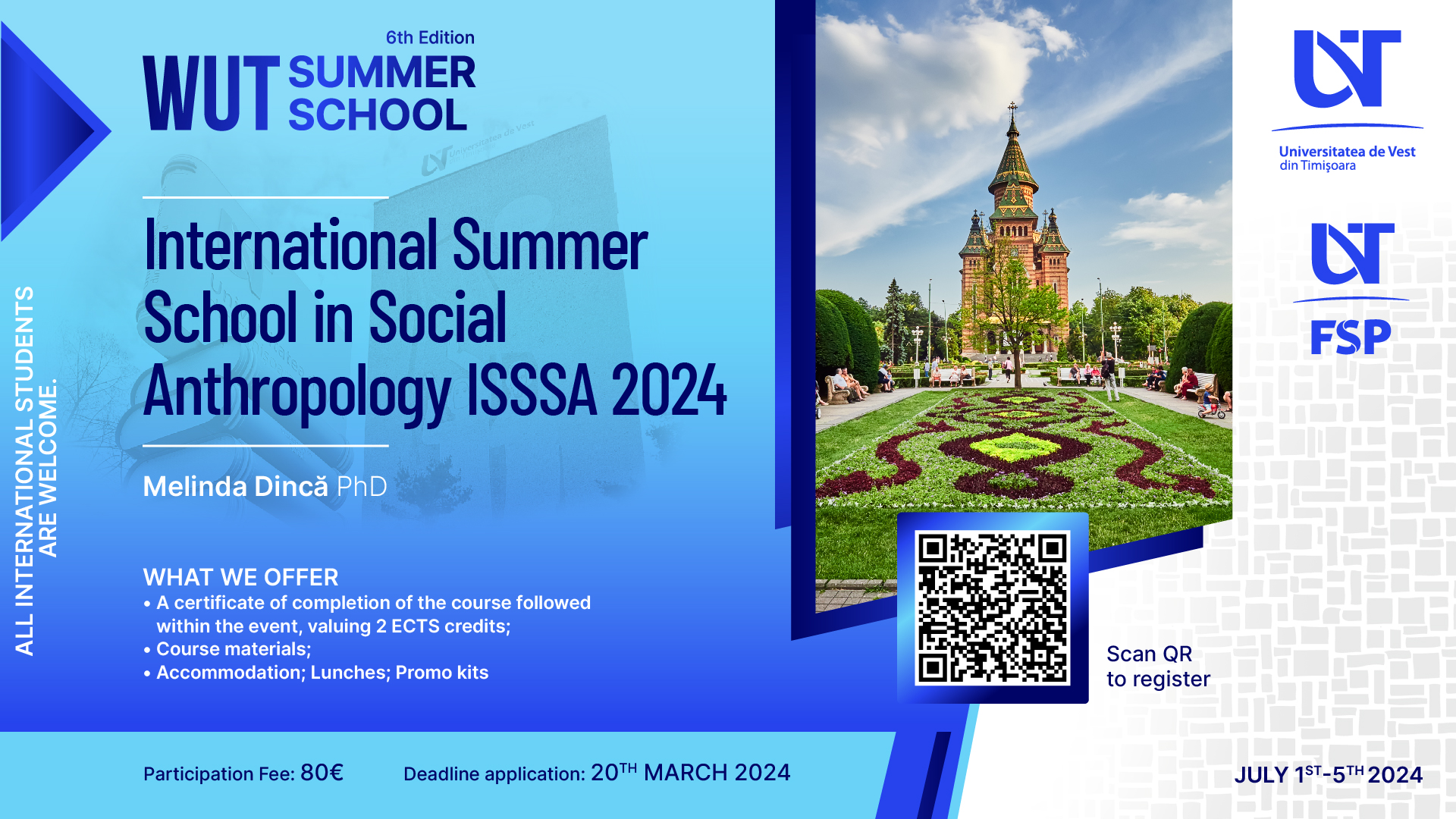
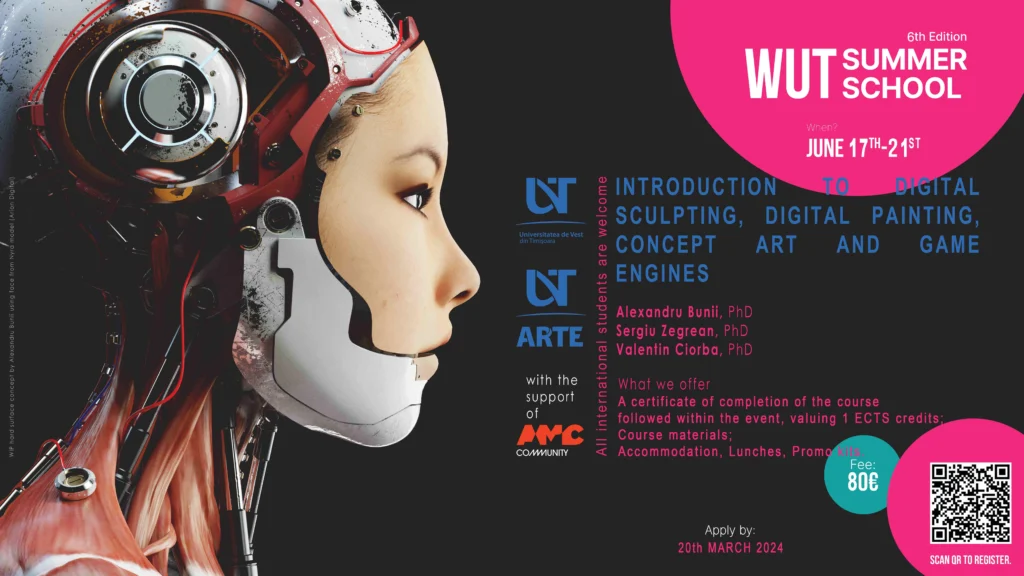
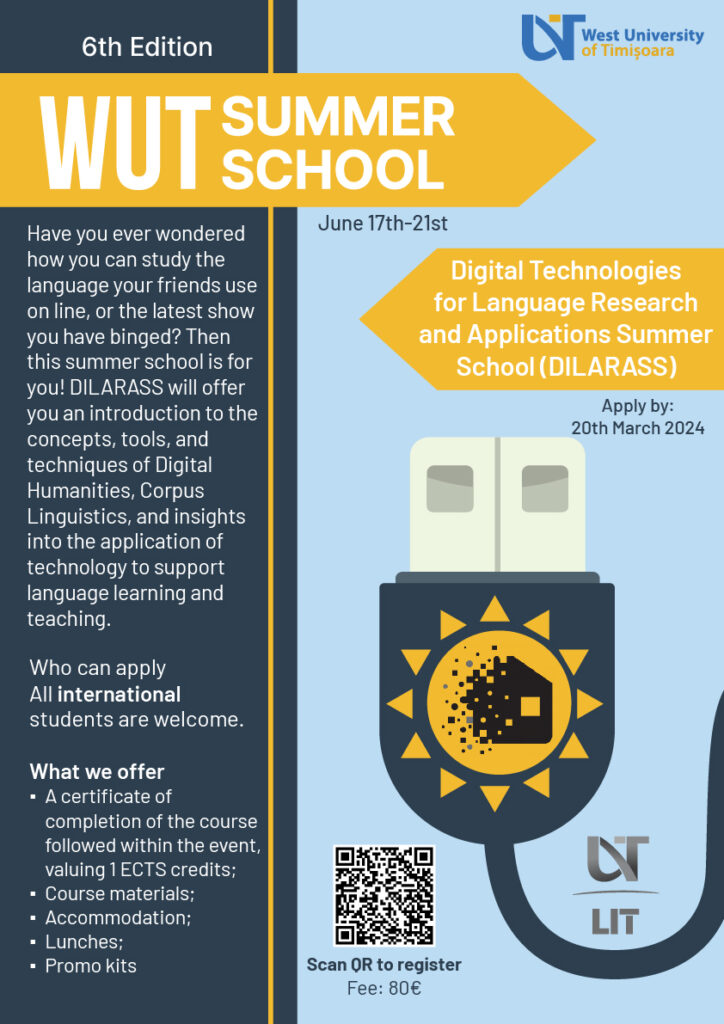
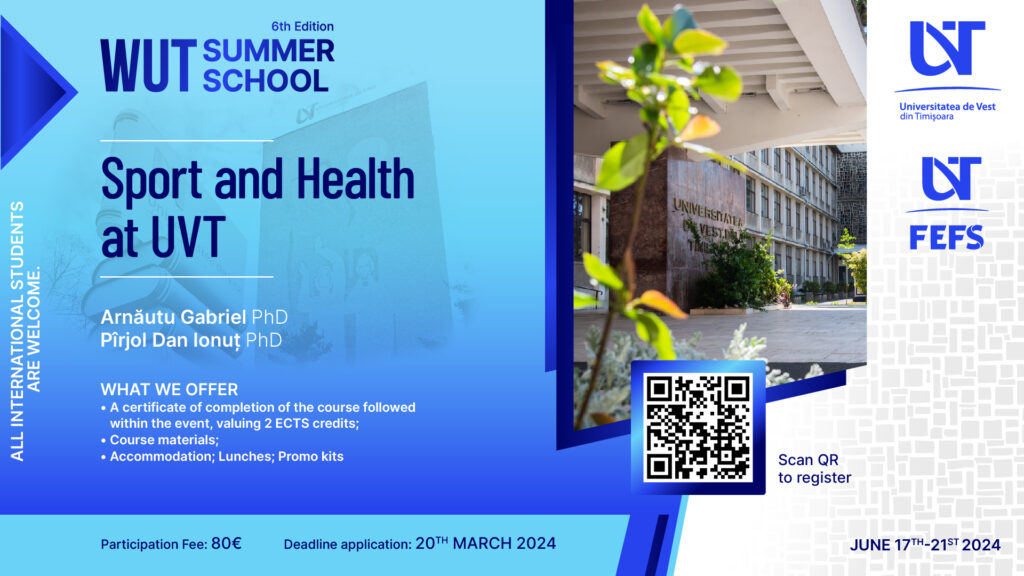
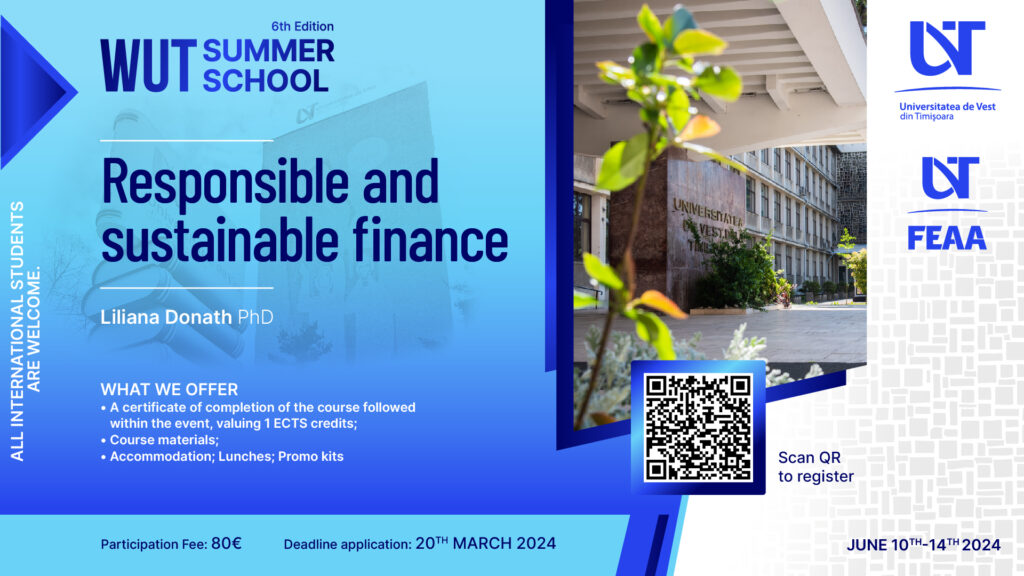
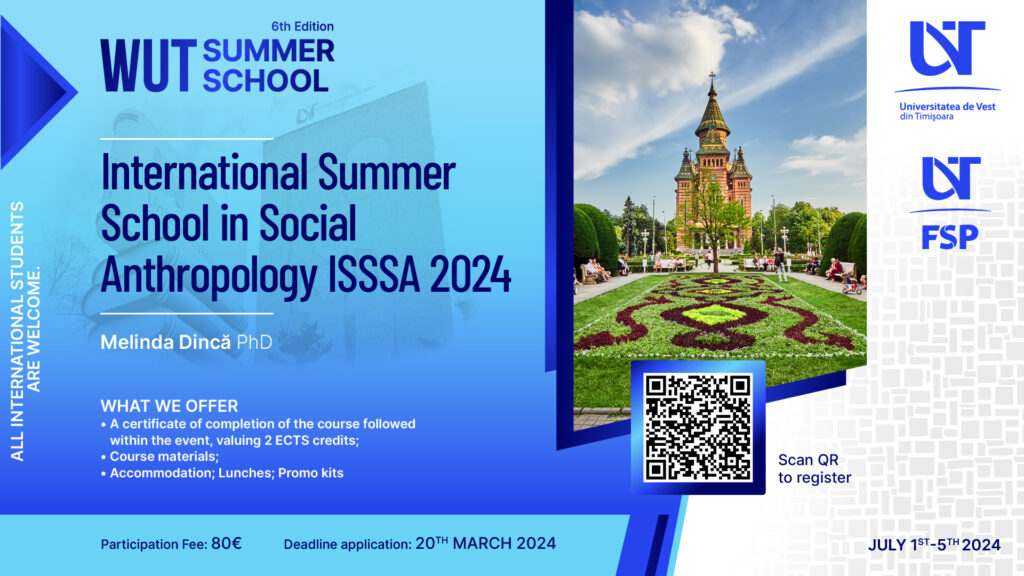
Registration
The links to the registration forms can be accessed by clicking on the title of the short-term study programmes above.
The application fee is 80 EURO and you will have to pay this amount should you be accepted. In this case, you will receive an e-mail containing the details of the bank account where you will have to deposit the registration fee.
*It is necessary to send the copy of the receipt (or a copy of the document proving the payment) at the e-mail address: international@e-uvt.ro
